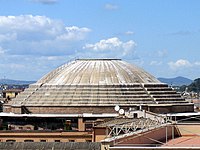
Photo from wikipedia
Abstract The application of warm mix additives to asphalt was studied to analyze their influence on the low-temperature fracture performance of asphalt materials. To this end, a set of warm… Click to show full abstract
Abstract The application of warm mix additives to asphalt was studied to analyze their influence on the low-temperature fracture performance of asphalt materials. To this end, a set of warm mix asphalt binders (WMABs) were prepared by mixing a hot mix asphalt binder (HMAB), PG 64-28 with two different types of warm mix additives (one being Sasobit and the other ET-3100). A bending beam rheometer test and a double edge notched tension test were performed to characterize the thermal stress and ductile resistance of the HMAB and WMABs, respectively. Fourier transform infrared spectroscopy (FTIR) was employed to study the modification mechanism during the application of the warm mix additives. The test results showed that the addition of Sasobit deteriorates the low-temperature fracture properties of the asphalt, with higher thermal stress, linearly increasing critical cracking temperature, and lower crack tip opening displacement. ET-3100 showed little effect on the low-temperature fracture properties of the bitumen, regardless of the added amount. The FTIR results showed that there was basically no chemical reaction in the modification process and both types of warm mix additives were physically modified.
Journal Title: Construction and Building Materials
Year Published: 2020
Link to full text (if available)
Share on Social Media: Sign Up to like & get
recommendations!